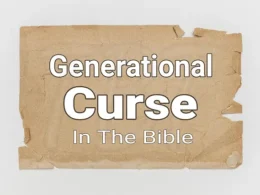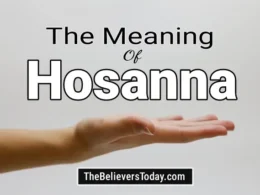The story of Jephthah in the Bible keeps many people in wonder. One would ask, Did Jephthah Sacrifice His Daughter to God?
In our last two messages before this one, we discussed Mercy and Obedience, as opposed to sacrifices to God. And if you noticed, mercy and obedience to the commandments of God are most delightful in the sight of God.
However, in this message, as we look at the person of Jephthah and his vow, we will very much attend to the question of whether or not Jephthah sacrificed his daughter.
Meanwhile, have you seen the message, Obedience Is Better Than Sacrifice? You should give it a read!
Who Was Jephthah In The Bible?
“Now Jephthah the Gileadite was a mighty man of valor, and he was the son of a prostitute: and Gilead became the father of Jephthah.” Judges 11:1 WEB.
Jephthah is one of the biblical characters whose stories depict the saying that destiny can be delayed but not defined. His family rejected him but later went in their multitude to search for him.
According to the Bible, Jephthah was a great warrior born to Gilead by a harlot, but later became their Judge for six years.
For clarity, Gilead here refers to the man who fathered Jephthah. But Gilead in the Bible also referred to the people of Israel who dwelt in a region beyond the Jordan (in the land of the Amorites). They were part of the tribe of Manasseh through whom Makir begat Gilead, and he begat the Gileadites.
There is very little information about the childhood of Jephthah in the Bible, but a significant part of his life was that after the wife of Gilead, his father gave birth to sons (and they grew up), they drove him out of the family. And because he was born by another woman, he was given no inheritance of his father.
Jephthah seemed helpless and fled from his brothers to the land of Tob. There, he met with people the scripture described as vain, worthless, and lawless men who joined him. It looks like Jephthah had some rebels who identified with him and followed after him.
However, the breakthrough of Jephthah began when the Ammonites declared war against Israel.
“Then the children of Ammon were gathered together, and encamped in Gilead. The children of Israel assembled themselves together, and encamped in Mizpah.
The people, the princes of Gilead, said one to another, ‘What man is he who will begin to fight against the children of Ammon? He shall be head over all the inhabitants of Gilead.’” Judges 10:17–18 WEB.
“It was so, that when the children of Ammon made war against Israel, the elders of Gilead went to get Jephthah out of the land of Tob;
and they said to Jephthah, ‘Come and be our chief, that we may fight with the children of Ammon.’
Jephthah said to the elders of Gilead, ‘Didn’t you hate me, and drive me out of my father’s house? Why have you come to me now when you are in distress?’
The elders of Gilead said to Jephthah, ‘Therefore we have turned again to you now, that you may go with us, and fight with the children of Ammon; and you shall be our head over all the inhabitants of Gilead.’
Jephthah said to the elders of Gilead, ‘If you bring me home again to fight with the children of Ammon, and Yahweh deliver them before me, shall I be your head?’
The elders of Gilead said to Jephthah, ‘Yahweh shall be witness between us; surely according to your word so will we do.’
Then Jephthah went with the elders of Gilead, and the people made him head and chief over them: and Jephthah spoke all his words before Yahweh in Mizpah.” Judges 11:5–11 WEB.
Jephthah Vowed A Vow
From verses 12 to 27 of the same chapter, there was diplomatic correspondence between Jephthah and the King of the Ammonites.
“However the king of the children of Ammon didn’t listen to the words of Jephthah which he sent him.
Then the Spirit of Yahweh came on Jephthah, and he passed over Gilead and Manasseh, and passed over Mizpah of Gilead, and from Mizpah of Gilead he passed over to the children of Ammon.
Jephthah vowed a vow to Yahweh, and said, ‘If you will indeed deliver the children of Ammon into my hand,
then it shall be, that whatever comes out of the doors of my house to meet me, when I return in peace from the children of Ammon, it shall be Yahweh’s, and I will offer it up for a burnt offering.’
So Jephthah passed over to the children of Ammon to fight against them; and Yahweh delivered them into his hand.
He struck them from Aroer until you come to Minnith, even twenty cities, and to Abelcheramim, with a very great slaughter. So the children of Ammon were subdued before the children of Israel.
Jephthah came to Mizpah to his house; and behold, his daughter came out to meet him with tambourines and with dances: and she was his only child; besides her he had neither son nor daughter.
When he saw her, he tore his clothes, and said, ‘Alas, my daughter! You have brought me very low, and you are one of those who trouble me; for I have opened my mouth to Yahweh, and I can’t go back.’” Judges 11:28–35 WEB.
Let me highlight three points here:
- Jephthah vowed to sacrifice the first thing that came out of his house to meet him if he won the war against the Ammonites.
- He led the war against the Ammonites and was victorious over them.
- Upon his return to his house, behold it was his only daughter who came out to welcome him.
When he saw it was his daughter, his reaction was No! Not my daughter! However, the scripture says that he tore his clothes and explained to her that he had made a vow to the Lord and could not go back on his word.
I would say it was devastating and painful for him to have to sacrifice his only daughter, but he seemed to be a man of his word. Notwithstanding, is it not written that I desire mercy and not Sacrifice?
Many questions cross the mind of one who ponders the story. Some of them are, Would he not have won the battle without making such a vow? Could he not have done something else? And most of all, Did Jephthah sacrifice his daughter?
While we may think that Jephthah went too far to be willing to sacrifice his daughter as he vowed or committed to the Lord, it is only fair to admit that his daughter agreed to his commitment.
Did Jephthah Sacrifice His Daughter?
“She said to him, ‘My father, you have opened your mouth to Yahweh; do to me according to that which has proceeded out of your mouth, because Yahweh has taken vengeance for you on your enemies, even on the children of Ammon.’
She said to her father, ‘Let this thing be done for me: let me alone two months, that I may depart and go down on the mountains, and bewail my virginity, I and my companions.’
He said, ‘Go.’ He sent her away for two months: and she departed, she and her companions, and mourned her virginity on the mountains.
At the end of two months, she returned to her father, who did with her according to his vow which he had vowed. She was a virgin. It was a custom in Israel,
that the daughters of Israel went yearly to celebrate the daughter of Jephthah the Gileadite four days in a year.” Judges 11:36–40 WEB.
Again, did Jephthah sacrifice his daughter? Yes. The Bible says that after two months had elapsed, he did to her according to his vow that he had vowed. And according to their custom, the daughters of Israel went four days yearly to mourn her death because she was a virgin.
Was the sacrifice of this human being necessary in the first place? Did the Lord accept such a sacrifice? Note that the activity was exclusively from Jephthah’s end. The reason he sacrificed his daughter was not necessarily because he won the battle but because he had to keep to his word. So saddening, I would say!
If you noticed, the same Jephthah led the Gileadites against Ephraim in the next chapter and was victorious against them.
Lesson From The Story Of Jephthah In The Bible
The story of Jephthah in the Bible, especially where he had to sacrifice his daughter because of a vow he made, reminds me of how many Believers behave today, especially in their denominations.
It often amazes me to see people go out to make vows or pledges to do things the Lord is not interested in. But in their minds, it is for the glory of God.
In the message, Beware of false prophets, I told a story I witnessed where a minister led many people to give huge some of many for the kind of grace he possessed. Those who did not have the money vowed to pay at a set time. If all that were true, Calabar, in particular, would have been filled with materially wealthy people, but the reverse is the case.
That aside, here are three lessons to learn from the story of Jephthah in the Bible:
- Learn to know who God is to you and what he requires of you.
- When you take your problems to God in prayer, do not negotiate.
- In life, always think before you commit.
For The Believers Today, God is our Father. He desires that we do good and show love to one another.
When we approach God in prayer as a family communion, we will not need to impress God with unnecessary promises.
Think things through before committing them, whether before the Lord or man. For by your words shall you be justified, says the scriptures.
Remember, what has to be will be. It is not necessarily because you made a sacrifice or pledge to God. Only trust and obey.











